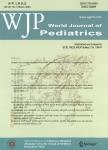Feeding methods, sleep arrangement, and infant sleep patterns: a Chinese population-based study
喂方法,睡觉安排,和婴儿睡觉模式: 中国基于人口的研究作者机构:Department of Children HealthNational Center for Maternal and Children HealthChinese Center for Disease Control and PreventionBeijingChina Department of EpidemiologySaint Louis University College for Public Health and Social JusticeSt.Louis.MOUSA The National Center for Chronic and Non-communicable Disease Control and PreventionChinese Center for Disease Control and PreventionBeijingChina Bronchoscopy CenterAffi liated Children Hospital of Beijing Capital Medical UniversityBeijingChina Department of Public HealthPeking University Health Science CenterBeijingChina
出 版 物:《World Journal of Pediatrics》 (世界儿科杂志(英文版))
年 卷 期:2016年第12卷第1期
页 面:66-75页
核心收录:
学科分类:1002[医学-临床医学] 100202[医学-儿科学] 10[医学]
基 金:supported by grants from maternal and children health hospitals of Xi'an Wuhan Changsha Chongqing Nanning Beijing Xiamen Jinan and Hailin
主 题:breast feeding feeding method infant sleep sleep arrangement
摘 要:Background:Findings from prior research into the effect of feeding methods on infant sleep are *** objectives of this study were to examine infants sleep patterns by feeding methods and sleep arrangement from birth to eight months ***:This longitudinal cohort study enrolled 524 pregnant women at 34-41 weeks of gestation and their infants after delivery in 2006 and followed up until eight months *** study subjects were recruited from nine women and children hospitals in nine cities in China(Beijing,Chongqing,Wuhan,Changsha,Nanning,Xiamen,Xi an,Jinan,and Hailin).Participating infants were followed up weekly during the first month and monthly from the second to the eighth month after ***-four hour sleep diaries recording infants sleeping and feeding methods were administered based on caregiver s *** mixed growth curve models were fi tted to estimate the effects of feeding methods and sleep arrangement on infants sleep patterns over time,controlling for maternal and paternal age,maternal and paternal education level,household income,supplementation of complementary food,and infant birth weight and ***:Exclusively formula fed infants had the greatest sleep percentage/24 h,followed by exclusively breast milk fed infants and partially breast milk fed infants(P0.01).Night waking followed a similar ***,the differences in sleep percentage and night waking frequency between exclusively formula and exclusively breast milk fed infants weakened over time as infants *** addition,compared to infants with bed-sharing sleep arrangement,those with room sharing sleep arrangement had greater daytime and 24-hour infant sleep percentage,whereas those with sleeping alone sleep arrangement had greater nighttime sleep ***:Our data based on caregiver s selfreport suggested that partial breastfeeding and bedsharing may be associated with less sleep in *** care professio



